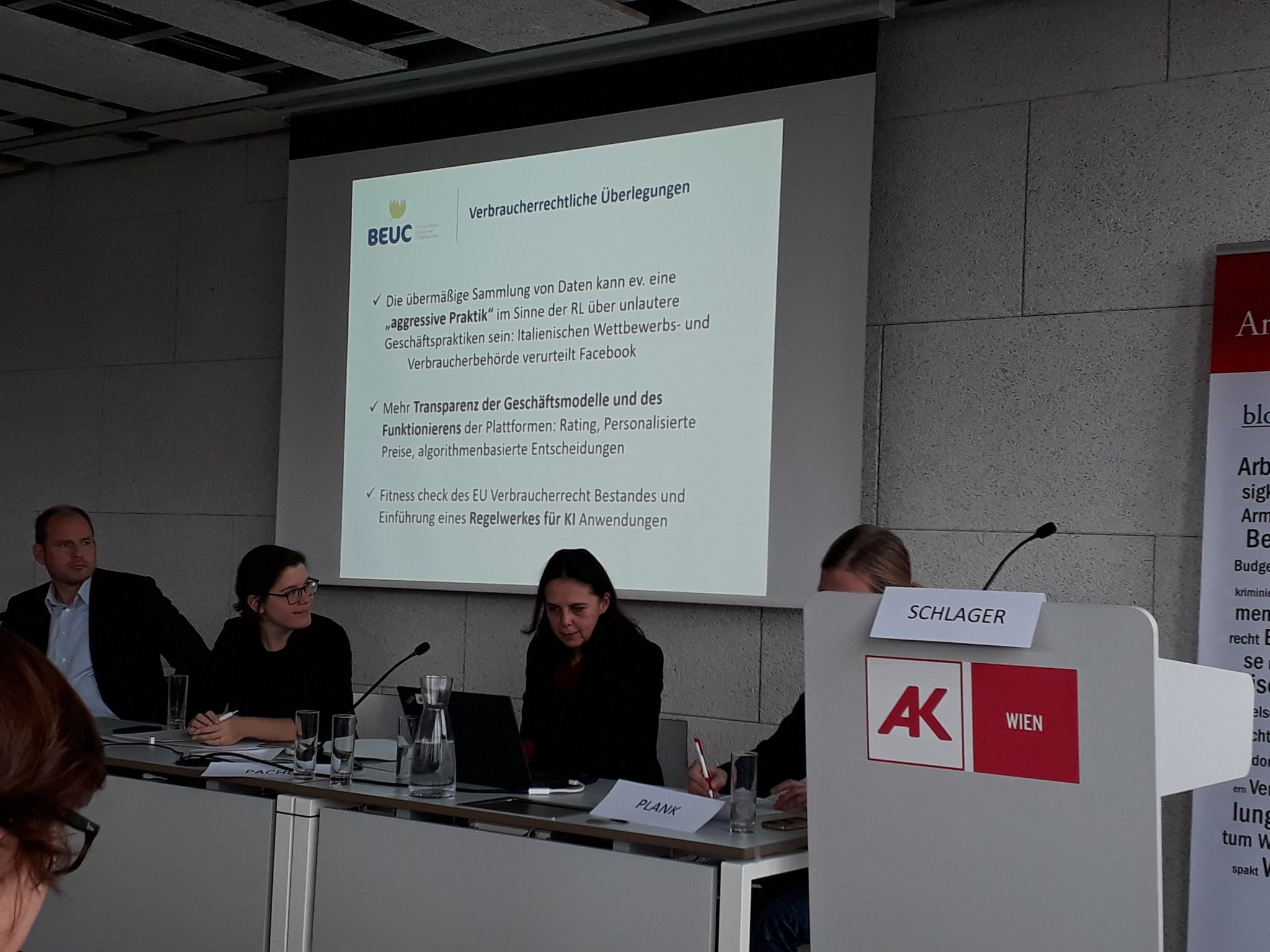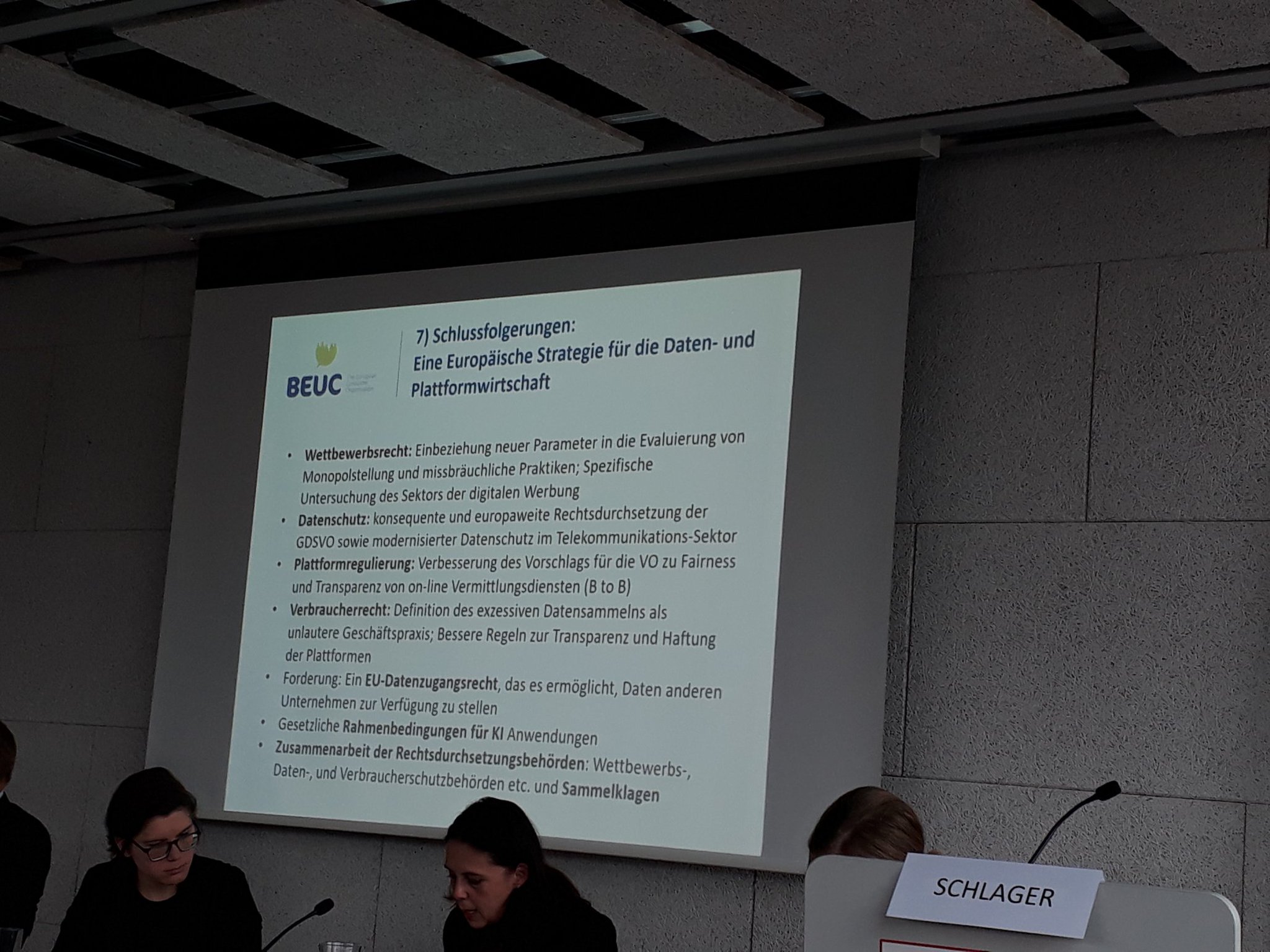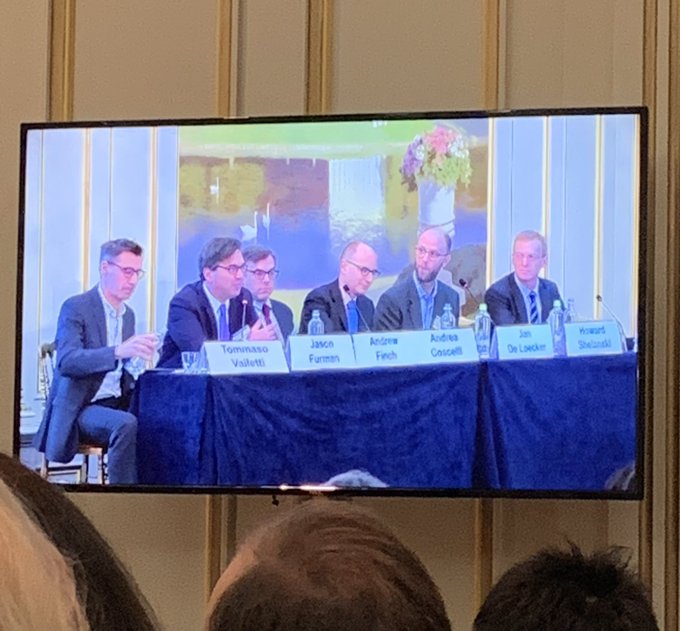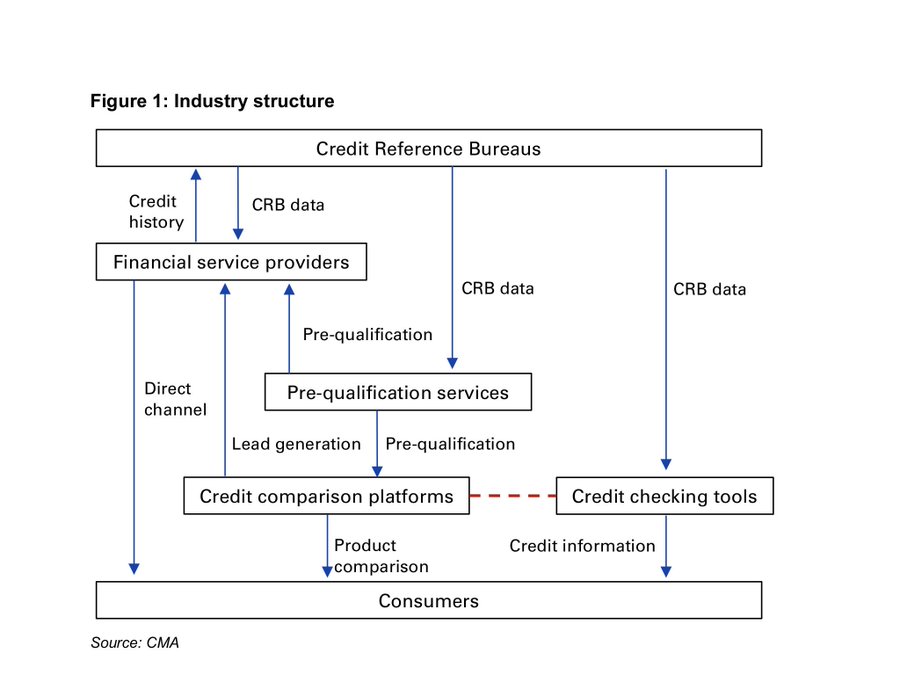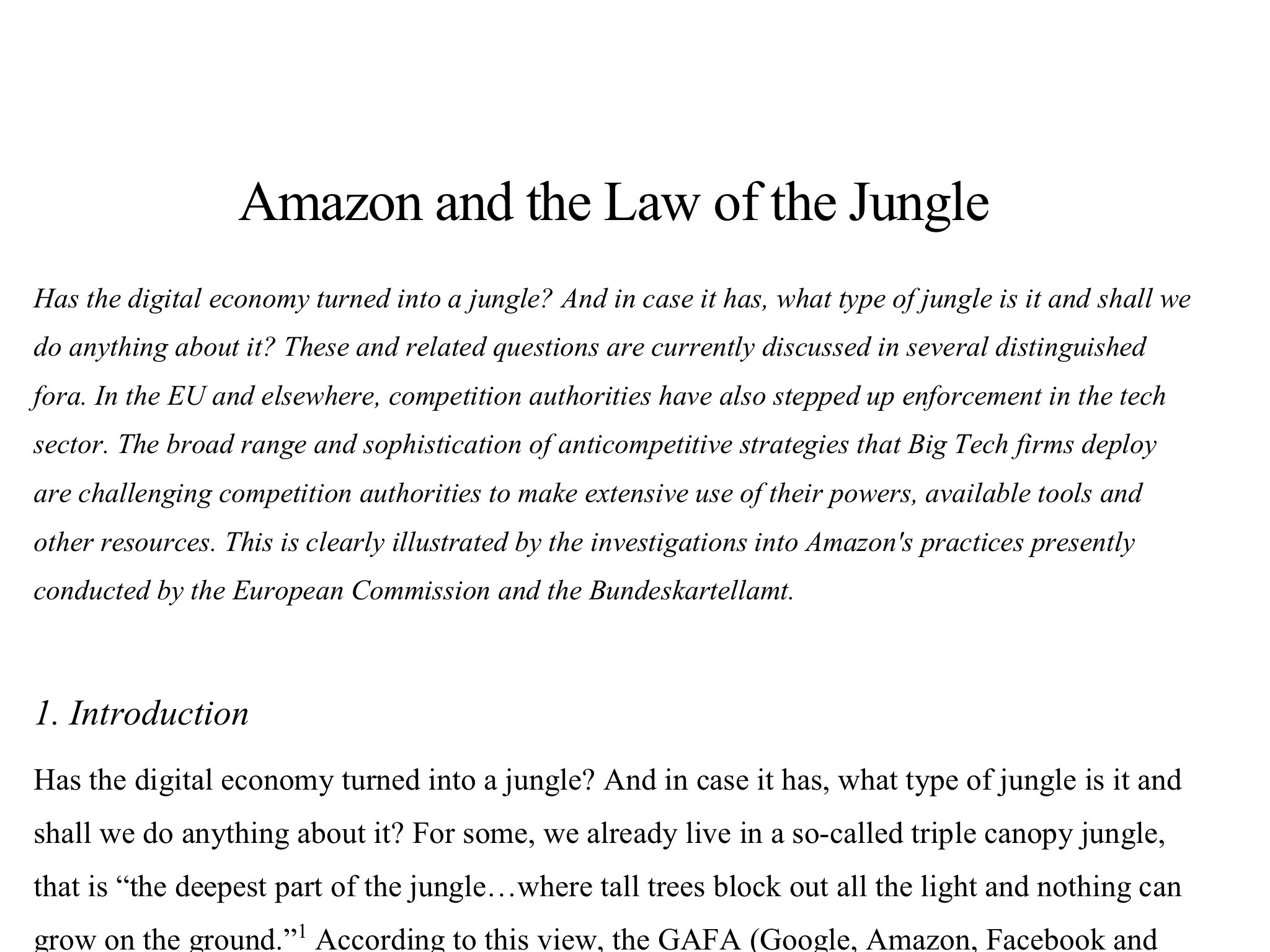BBC, Podcast (from 17:00), here.
Friday, December 28, 2018
Thursday, December 20, 2018
Bayer/Monsanto - protecting innovation and product competition in seeds, traits and pesticides
EC Merger Brief, here (p. 6 ff.).
Wednesday, December 19, 2018
Tuesday, December 18, 2018
DRAFT ETHICS GUIDELINES FOR TRUSTWORTHY AI
EC's HIGH-LEVEL EXPERT GROUP ON
ARTIFICIAL INTELLIGENCE, here.
Modernisation of EU consumer protection rules: A new deal for consumers
EP ThinkTank, Briefing here.
The IRA, Social Media and Political Polarization in the United States, 2012-2018
P. Howard, B. Ganesh, D. Liotsiou, J. Kelly & C. François, here.
Monday, December 17, 2018
UK Fintech Revolut Receives EU Banking Licence through the central bank in Lithuania
Financemagnates.com, here.
Vom Datenschutz zur human-zentrierten Datenwirtschaft
M. Beyer-Katzenberger, hier (s. 71 ff.), hier.
DEMOCRACY UNDER THREAT: RISKS AND SOLUTIONS IN THE ERA OF DISINFORMATION AND DATA MONOPOLY
House of Commons, Canada, Report of the Standing Committee on Access to
Information, Privacy and Ethics, here.
Thursday, December 13, 2018
Wednesday, December 12, 2018
An EU Competition law Analysis of Online Display Advertising in the Programmatic Age
D. Geradin, D. Katsifis, here.
Report: Google PLA antitrust remedy turning comparison engines into agencies
SearchEngineLang, here.
Tuesday, December 11, 2018
Freigabe des Zusammenschlusses der CTS Eventim AG & Co. KGaA mit der FKP SCORPIO Konzertproduktionen GmbH
Bundeskartellamt, Fallbericht hier.
Economic dependence: what can we learn from the industrial organization approach?
P. Bougette, O. Budzinski, F. Marty, here.
Written Testimony
S. Pichai, Before the House Judiciary Committee, Hearing on “Transparency & Accountability: Examining Google and its Data Collection, Use, and Filtering Practices” December 11, 2018, here.
Monday, December 10, 2018
Sunday, December 09, 2018
Saturday, December 08, 2018
Friday, December 07, 2018
Thursday, December 06, 2018
Location Data: GPS, Wi-Fi, and Spatial Analytics
Class 2 of Digital Data Flows Masterclass:
Emerging Technologies, Presentation here.
Collaborative Economy: Challenges & Opportunities
Proceedings of the 14th International Conference on Internet,
Law & Politics. Universitat Oberta de Catalunya, Barcelona,
21-22 June, 2018, here.
Wednesday, December 05, 2018
Tuesday, December 04, 2018
Experian/ClearScore
CMA, Provisional findings report here.
(What I find a bit surprising is the playing down of the PSD2-Open Banking effects)
(What I find a bit surprising is the playing down of the PSD2-Open Banking effects)
Monday, December 03, 2018
EU competition rules on vertical agreements – evaluation
EC, here.
Now Feedback period, Public Consultation follows (Q1 2019)
Now Feedback period, Public Consultation follows (Q1 2019)
Sunday, December 02, 2018
Saturday, December 01, 2018
Friday, November 30, 2018
Le Conseil constitutionnel sur la notion de “déséquilibre significatif”
Décision n° 2018-749 QPC du 30 novembre 2018, ici.
Thursday, November 29, 2018
What's in the water in Germany?
Competition Lore, with C. Beaton Wells and R. Podzun, Podcast here.
(Recorded before the Bundeskartellamt's Amazon investigation).
(Recorded before the Bundeskartellamt's Amazon investigation).
Wednesday, November 28, 2018
Zero-price markets: Updating the Analytical Toolkit
M. Botta, Presentation here.
- 1. COMPETITION POLICY IN ZERO-PRICE MARKETS UPDATING THE ANALYTICAL TOOLKIT MARCO BOTTA Joint meeting of the OECD Competition and Consumer Policy Committees Paris, 28th November 2018 Max Planck Institute for Innovation and Competition | Munich
- 2. Outline 2 • Updating the competition analytical tools: 1) Relevant market. 2) Market power. 3) Anti-competitive conducts. 4) Potential remedies. • Conclusions – questions for further debate.
- 3. Limits of the SSNIP test 3 • The relevant market is traditionally defined via the SSNIP test. • Problem: what is “small, but significant price increase” in a zero-price market? • ‘Free effect’ : when the reference price is zero, consumers will automatically switch to any competing product in case of price increase ➢ excessively broad definition of the relevant market. • Multi-sided markets: SSNIP test will limit market definition to one side of the market.
- 4. Alternative tools to define therelevant market 4 • Alternative tools follow a similar logic as the SSNIP test: 1) SSNIC (i.e. increase consumers’ costs): + data / attention ➢ + consumers’ costs. 2) SSNDQ (i.e. decline product quality): + data / attention ➢ - product quality. • Limits of the alternative tools in zero-price markets: 1) Quantification: +5% amount of personal data / attention? 2) Heterogeneous consumers’ preferences: what type of data/attention should we take into consideration? 3) Positive effects: + data transferred can increase the product quality. 4) SSNIC and SSDQ do NOT catch multi-sided markets.
- 5. Market power in zero-price markets 5 • Market power within the relevant market: element to trigger enforcement of competition policy (e.g. unilateral conducts, merger control, vertical agreements). • Traditional definition of market power: ability of the firm to raise prices above the competitive level. • ‘Free effect’ : in zero-price markets firms can never raise prices above 0 ➢ consumers would always switch to other products = NO firm has market power. • The market share has limited relevance to assess market power in zero- price markets.
- 6. Factors to estimate market power in zero-price markets 6 • A number of factors can be assessed to estimate the degree of market power in zero-price markets: 1) Attention degree: users’ attention on the Internet is a ‘scarce’ resource. 2) Direct and indirect network effects: number of users; product quality. 3) Multi-homing and switching costs. 4) Access to data ➢ possibility to purchase data from third parties. 5) Sunk investment costs. 6) Degree of innovation: a) Relevance of innovation in the market; b) Evidence of past radical innovations; c) Evidence of past entry.
- 7. Updating anti-competitive conducts 7 • Assessment of anti-competitive conducts based on ‘price’ should be revised in zero-price markets. • Cartels fixing the price at zero: shift from a per se prohibition to an effect analysis. • Predatory pricing ➢ what is ‘predatory’ in a zero-price market? 1) Fallacies in accordance with the current legal standards: a) EU: presumption of predation when prices are below average marginal costs. b) USA: requirement of likely recoupment in the same market. 2) Recoupment requirement should be always required, BUT extended to other ‘sides’ of the market.
- 8. Updating anti-competitive conducts 8 • Exploitative conducts in zero-price markets (EU): 1) Excessive pricing (i.e. asking ‘too much data’) ➢ NOT relevant. 2) Discriminatory pricing ➢ NOT relevant. 3) Unfair contractual clauses: relevant in zero-price markets a) Clauses ‘unilaterally’ imposed by the dominant firms (e.g. social network unilaterally modified the data protection terms). b) ’Unfair’: clauses ‘un-related’ to the product, and outside the ordinary commercial business practices (e.g. users’ data are transferred to third parties without the user’s consent). c) Relationship with consumer and data protection law: open question.
- 9. Competition law remedies in zero-price markets 9 • Zero-price markets pose new challenges to the application of the traditional antitrust toolkit ➢ infringement decision + fine is NOT an effective remedy. • Structural v. behavioural remedies: 1) Structural remedies (e.g. un-bundling; divestiture of a subsidiary): NOT efficient ➢ negative effect on direct network effects and product quality. 2) Behavioural remedies: the NCA ‘guides’ the firm in terms of competition law compliance: a) Tailor-made ➢ designed in cooperation with the firm (i.e. commitments); b) Possible periodic revision ➢ adaptation to the market dynamics. c) Need of monitoring. d) Risk of market regulation ➢ overlap with data protection and consumer law.
- 10. Behavioural remedies in zero-price markets 10 • Examples of behavioural remedies in zero-price markets: 1) Increase consumers’ awareness (e.g. increase transparency of the contractual terms; info about the personal data collected); 2) Setting minimum standards of data protection terms (e.g. max. duration of data storage); 3) Giving consumers the opportunity to periodically revise the consent to the processing of their personal data; 4) Right to data portability.
- 11. Relationship with sector-regulation 11 • Antitrust remedies can clarify unclear aspects in data/consumer law protection. • Cooperation between NCA and data protection /consumer law authorities: 1) Exchange of information during the investigations; 2) Joint sector-inquiries; 3) Consultation in designing behavioural remedies. • Competition v. consumer / data protection remedies: 1) Advantage: antitrust remedies ensure higher degree of deterrence. 2) Disadvantage: definition relevant market and market power.
- 12. Conclusions – questions for further debate 12 • Are SSNIC and SSNDQ effective tools to define the relevant market? • What aspects should be taken into consideration to assess market power in zero-price markets? • How should the assessment of anti-competitive conducts be adjusted to the peculiarities of zero-price markets? • What type of competition law remedies could be introduced in zero-price markets? • What are the possible forms of cooperation between NCAs and sector regulators when it comes to designing the remedies?
- 13. 13 Thank you very much for your attention! marco.botta@ip.mpg.de
‘Principles of the Law Governing the Internet’
Members of the national Parliaments of: the Argentine Republic; the Kingdom of Belgium; the Federative Republic of Brazil; Canada; the French Republic; Ireland; the Republic of Latvia; the Republic of Singapore; and the United Kingdom of Great Britain and Northern Ireland, here.
Disinformation and ‘fake news’ (and FB privacy and antitrust)
House of Commons, Digital, Culture, Media and Sport International Grand Committee, here (both videos and transcripts).
Tuesday, November 27, 2018
Consumer-Lending Discrimination in the Era of FinTech
R. Bartlett, A. Morse, R. Stanton, N. Wallace, here.
Monday, November 26, 2018
3D printing and intellectual property futures
T. Birtchnell, A. Daly, T. Rayna and L. Striukova for the UK IPO, here.
Sabbiere, Innovazione e Concorrenza: Il Caso Fintech
S. Vezzoso (autrice del blog), qui. Primissima bozza, commenti più che graditi!
Sunday, November 25, 2018
Saturday, November 24, 2018
Friday, November 23, 2018
Thursday, November 22, 2018
Wednesday, November 21, 2018
The Economics of the Gig Economy – with an Application to the Spanish Taxi Industry
M. Silos Ribas, here., pp. 305-342.
Tuesday, November 20, 2018
Regimes Regulatórios Promotores de Inovação no Setor Financeiro
Autoridade da Concorrência (AdC), aqui.
Monday, November 19, 2018
DATA MOBILITY: The personal data portability growth opportunity for the UK economy
Ctrl-Shift for the UK the Department for Digital, Culture, Media and Sport (DCMS), here.
Saturday, November 17, 2018
Friday, November 16, 2018
Thursday, November 15, 2018
Wednesday, November 14, 2018
Tuesday, November 13, 2018
DPIA DIAGNOSTIC DATA IN MICROSOFT OFFICE PROPLUS
Commissioned by the Ministry of Justice
and Security for the benefit of SLM Rijk, here.
Monday, November 12, 2018
Subscribe to:
Comments (Atom)
-
Dezent... Hier . Schnelle 2 cents: Das LG übersieht mMn dass „eigenes Produkt“ im Kontext von generativer Suche funktional verstanden werd...
-
Open Future, here .
-
Video here. [The name AFA makes me nostalgic even of the Chicago School: same with you?]
-
Fresh off the press release: the Italian antitrust authority has knocked — quite literally — on Meta’s door. A dawn raid hit the company’s ...
-
Politico.eu, here.
-
Zeit.de, hier .
-
Chez Oles and Or, here . Many years ago, I also had an "amicable but tough Competition Exchange" with Nicolas on roughly the same...


